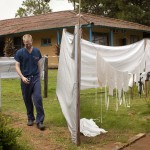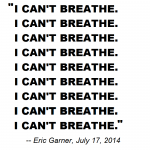 According to the World Health Organization (WHO), as of November 26, there had been almost 16,000 cases of Ebola worldwide in the current outbreak; there had also been 5,689 deaths. If someone catches Ebola, they have a 1 in 3 chance of dying of the illness. The disease has ravaged West Africa, often taking the most vulnerable. The medical care available to the average West African is abysmally poor. On October 22, Reuters reported:
According to the World Health Organization (WHO), as of November 26, there had been almost 16,000 cases of Ebola worldwide in the current outbreak; there had also been 5,689 deaths. If someone catches Ebola, they have a 1 in 3 chance of dying of the illness. The disease has ravaged West Africa, often taking the most vulnerable. The medical care available to the average West African is abysmally poor. On October 22, Reuters reported:
Liberia, which is still struggling to recover from a devastating 1989-2003 civil war, has seen its healthcare system buckle. It had only around 50 trained doctors before the outbreak, several of whom have since died from the virus, and it has desperately appealed for foreign health workers.
Most Americans and people treated in the United States with Ebola have recovered from the disease. Basic fluid replenishment, rested medical teams, and better general population health in the United States may be contributing factors. If you get Ebola and are treated in the United States, you are more than likely to recover. This is not the case in West Africa. The “have-nots” fall like flies while the privileged continue to thrive.
Although the situation on the ground in West Africa has improved somewhat, the Associated Press reported this Tuesday that Doctors without Borders is warning, “The international response to Ebola is still too slow and piecemeal.”
When the outbreak of Ebola was at its height, privileged Westerners’ let their self-centeredness rule. Rather than focusing primarily on how to combat Ebola at ground zero in West Africa, unending news coverage and social media pontificating expended endless energy on keeping out the frightening “other,” often denying science and medicine’s recommendation. Fear began to rule instead of good sense. Nick Kristof noted:
An alarming new symptom of Ebola in America: It seems to make brains mushy and hearts hard.
The Bad News of our world is that tremendously horrible diseases assail us as human beings. Ebola’s misery of fever, vomiting, diarrhea, and bleeding from orifices shocks our modern sensibilities. Ebola is monstrous and feels uncontrollable. We are used to the protected enclaves of our sterile hospitals and doctors offices, our massive health care system, our insurance coverage, our medicines and home remedies.
When human beings shrivel up and die in great suffering, when their family members also die, our hearts break. We shake our fists, crying out, “This suffering is wrong! This is not as it should be!”
Further, the Bad News of our world is that disease brings out fear and selfishness in our hearts. The urge to self-protect is strong. Some of this is good. Prudent steps should certainly be taken in order to protect oneself. But of course complete and total safety is not possible in this broken world. Engaging in our world could always mean we could become ill, get in an accident, or be harmed in some other way. Life is not risk-free, but vivid visual representations of threats like Ebola, the otherworldly visions of health care workers in protective suits and masks and goggles, these things remind us of how real death is and how our lives can change in an instant.
Our longing for wholeness, for health, and our repulsed rejection of the fate of death reveal to us that creation is not now as it should be. There is an “ought” deep at the heart of creation: things “ought” to be different. We cry out for physical healing. We need spiritual healing as well, that which moves us beyond concern merely for our own survival, that which will motivate us to care for our neighbor.
Into the midst of our sick and broken world comes Jesus. Jesus’ message of Good News says to us that God agrees that this world is not as it should be. God created a good world, but humans turned away from Him and His good creation. Now we are broken. But rather than angrily abandoning us for trashing the good gift we have been given in this world, Jesus comes to be Immanuel, God with us.
Jesus’ three year ministry on earth was all love and in His ministry, a central component was healing the sick. Jesus’ ministry of healing was a foretaste of the coming restoration of creation that God will bring about one day. It was the beginning of the Good News of God’s pinpricks of light piercing through the darkness. Despite many medical advances, more destructive diseases continue to emerge. Humanity has not been able to evolve beyond the illnesses that destroy it, but God will interrupt history again as He did through Jesus and will bring health to the world completely one day.
The inaugural act of Jesus’ ministry on earth was to go into His hometown synagogue and read the Good News of Isaiah 61:
“The Spirit of the Lord is on me,
because he has anointed me
to proclaim good news to the poor.
He has sent me to proclaim freedom for the prisoners
and recovery of sight for the blind,
to set the oppressed free,
to proclaim the year of the Lord’s favor.”–Luke 4:18-19, NIV
This mission statement for His ministry comes from the Old Testament practice of the Year of Jubilee. The Year of Jubilee came every 50 years in Israel. It was to be a time when “slaves were freed, debts were cancelled and ancestral property was returned to the original family” (NIV Study Bible notes for Luke 4:19).
The Year of Jubilee was joyous Good News for God’s people. Jesus is saying here that His mission was to bring the Good News of freedom, restoration, and things being set right again to God’s people–and the offer of this Good News to all people. This would include restoration for the poor, freedom for the oppressed, and physical healing for the unwell. These were to be signs that the Kingdom of God had come near. These were to be the pinpricks of light pushing little-by-little through the darkness.
This manifesto was not just wishful thinking on Jesus’ part. In fact, healing and restoration were a central part of his actual ministry.
At sunset, the people brought to Jesus all who had various kinds of sickness, and laying his hands on each one, he healed them.–Luke 4:40
He welcomed them and spoke to them about the kingdom of God, and healed those who needed healing.–Luke 9:11
Those troubled by impure spirits were cured, and the people all tried to touch him, because power was coming from him and healing them all.–Luke 6:18b-19
Besides the healing crowds of people who were ill or disabled, the Gospels also record very personal healing stories. Jesus heals Peter’s mother-in-law of a fever (Luke 4:38-39). He heals a leper (Luke 5:12-13). He heals a paralytic (Luke 5:17-26). The personal stories of healing go on and on continuously throughout the Gospels. You could almost argue that the Gospels are a record of God healing portions of His creation. The pinpricks of light in the darkness grow more and more. The dark, teeming void of chaos of the book of Genesis is beginning to recede; instead, wholeness, freedom, and restoration is coming.
There are still stories in the world today where pinpricks of light came through the darkness of disease and illness. We don’t know why some are healed, and some are not. But the miraculous still does sometimes pierce through our world, reminding us of how things “ought” to be and how they one day will be. In addition, the miracles of modern medicine are good gifts of healing given at the hands of God too. He has set an order in creation such that certain truths about how our world functions are discoverable. The relieving of sickness, disease, and disability through the kind and skillful hands of doctors and nurses is one way God continues to bring healing and restoration to our broken world.
In the heroes of the Ebola crisis, the doctors and nurses who put themselves in harms’ way for the sake of relieving the suffering of the broken, we see the continuing hand of God reaching into a broken world. We see Immanuel in these people. We see Good News through them.
In Jesus’ compassion for the sick and disabled, I see God’s compassion to humanity. His heart toward us is one of love, one of coming near to us in our suffering. I have hope for a sick and broken world because of Jesus. I thank God that He will bring about a new heavens and a new earth one day. I thank Him that He is remaking those who believe in Him; I thank Him that 2 Corinthians says that believers in Jesus are new creations in Christ. I thank God that He is drawing people to Him who may not yet believe. I thank God for His daily grace to this world that despite our sin and our selfish tendencies, a lot of good still gets done on this spinning planet. God is good even to those who do not believe in Him:
“He causes his sun to rise on the evil and the good, and sends rain on the righteous and the unrighteous.”–Jesus in Matthew 5:45
This work of new creation is ongoing in me too. As God kills my sinful nature day-by-day, He raises me to new life daily as well. One day, this work will be done–in me and in creation in general. Until then, I wait and I watch. And I see the pinpricks of darkness continue.
Once there was only dark. You ask me, the light’s winning.–Rust Cohle, True Detective
——————-
Community discussion guidelines:
Because this is a Christian blog, the things I’m talking about will obviously be topics that people feel strongly about in one direction or another. Please keep in mind that this is a place for substantive, respectful conversation. All perspectives are welcome to discuss here as long as all can treat each other with kindness and respect. Please ignore trolls, refuse to engage in personal attacks, and observe the comment policy listed on the right side of the page. Comments that violate these guidelines may be deleted. For those who clearly violate these policies repeatedly, my policy is to issue a warning which, if not regarded, may lead to blacklisting. This is not about censorship, but about creating a healthy, respectful environment for discussion.
P.S. Please also note that I am not a scientist, but a person with expertise in theology and the arts. While I am very interested in the relationship between science and faith, I do not believe I personally will be able to adequately address the many questions that inevitably come up related to science and religion. I encourage you to seek out the writings of theistic or Christian scientists to help with those discussions.
———————-
photo credit: Seattle Municipal Archives via photopin cc















